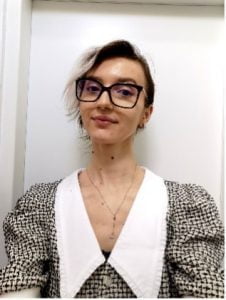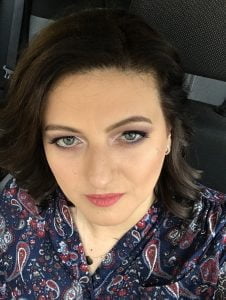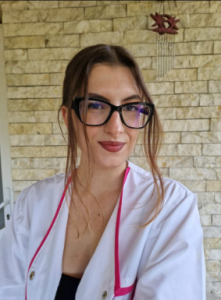Adresse: 2, Eftimie Murgu Sq., Timisoara, 3000411
Téléphone: 0256494604
E-mail: cadehelean@umft.ro
Chef de la clinique universitaire
Membres
La discipline de la toxicologie, de l’industrie pharmaceutique, de la gestion et de la législation est un programme complexe qui résume des sujets interdisciplinaires importants. La discipline de la toxicologie fait partie de la catégorie des sciences pharmaceutiques de spécialité et a été fondée et introduite dans le programme d’études analytiques de la Faculté de pharmacie lors de sa création en 1991. La toxicologie a été décrite comme une science autonome dès 1815 par le fondateur de la toxicologie moderne, Mathieu Joseph Bonaventura Orfila, et depuis lors, elle a connu un progrès significatif en passant d’une science descriptive à une science appliquée.
La toxicologie est considérée comme une science translationnelle, comprenant les principes de la chimie, de la biochimie, de la pathologie, de la physiologie, de l’immunologie, de l’écologie, des biomathématiques et des statistiques, qui se combinent avec les principes cliniques afin de déterminer et de résoudre/réduire les risques pour la santé humaine.
Depuis 2004, la discipline de toxicologie est coordonnée par le Prof. univ. Dr. Pharm. primaire Habil. Cristina Adriana Dehelean, qui s’est constamment préoccupée d’augmenter la qualité de l’activité d’enseignement, mais aussi d’accroître la visibilité d’un point de vue scientifique, tant au niveau national qu’international. Dans cette perspective, des cours de troisième cycle, des cercles scientifiques, des écoles d’été et des ateliers pour les étudiants et les spécialistes du domaine sont organisés chaque année, avec des invités exceptionnels du pays et de l’étranger. Afin d’augmenter la qualité de l’activité de recherche, des équipements performants ont été achetés, ce qui a permis de créer de nouvelles opportunités et orientations de recherche pour les étudiants, les étudiants à la maîtrise et au doctorat de la discipline.
Les principaux objectifs didactiques sont représentés par l’étude de la toxicité et des éléments nocifs induits par certains composés toxiques industriels, classes de médicaments, médicaments, pesticides, mycotoxines, additifs alimentaires, détergents, substances toxiques de combat, radiations, ainsi que l’approfondissement des principes généraux de la toxicologie. A l’issue des 5 années d’études universitaires, le futur spécialiste dans le domaine de la médecine doit avoir une vision large des risques toxicologiques multiples dans le monde contemporain et une orientation pratique efficace dans la relation avec les patients.
La discipline de la toxicologie, de l’industrie pharmaceutique, de la gestion et du droit offre un riche programme d’études dans le domaine des programmes de licence, de résidence, de maîtrise et de doctorat.
L’offre de formation comprend les cours obligatoires et les travaux pratiques suivants dans le cadre du programme de licence pour pharmaciens et assistants en pharmacie :
- Terminologie médicale – année I Pharmacie série roumaine et française
- Premiers secours et urgences médicales – année I Pharmacie série roumaine, française et anglaise
- Sémiologie – applications pharmaceutiques – année II Pharmacie série roumaine, française et anglaise
- Pharmacogénétique – année II Pharmacie série roumaine et française
- Santé Publique et Gestion – Année II Pharmacie Série Roumaine et Française
- Bioéthique et déontologie – année III Pharmacie série roumaine et française
- Médicaments biologiques – année III Pharmacie série roumaine et française
- Toxicologie – IV année Pharmacie série roumaine et française
- Méthodologie de la recherche scientifique – IV année Pharmacie série roumaine et française
- Législation pharmaceutique – année IV Pharmacie série roumaine et française
- Médicaments homéopathiques et médicaments vétérinaires – IV année Pharmacie série roumaine et française
- Industrie du médicament et biotechnologies – année V Pharmacie série roumaine et française
- Toxicologie – année V Pharmacie série roumaine et française
- Gestion et marketing – année V Pharmacie série roumaine et française
- Pharmacovigilance – année V Pharmacie série roumaine et française
Pour les études de premier cycle de courte durée (assistance en pharmacie), l’offre de formation comprend les cours obligatoires et les travaux pratiques suivants :
- Eléments de gestion et de commercialisation pharmaceutique – année III ASF-L
- Législation pharmaceutique – année III ASF-L
- Eléments de toxicologie – année III ASF-L
- Eléments de technologie pharmaceutique industrielle – année III ASF-L
- Notions de pharmacovigilance – année III ASF-L
- Terminologie pharmaceutique et médicale – année 1 ASF-D
- Premiers secours – année I ASF-D
Pour les études de premier cycle de courte durée (cosmétique médicale et technologie des produits cosmétiques), l’offre de formation comprend les cours obligatoires et les travaux pratiques suivants :
- Hygiène – année I CM
- Anatomie pathologique – année I CM
- Premiers secours et urgences médicales – année I CM
- Produits biologiques – année II CM
- Notions de dermatologie clinique – année II CM
- Equipements, produits et techniques de dermato-cosmétique – année II CM
- Dermatovénérologie – année II CM
- Bioéthique et déontologie médicale – année II CM
- Méthodologie de la recherche scientifique – année II CM
- Industrie cosmétique et pharmaceutique – année III CM
- Cosmétovigilance – année III CM
- Toxicologie dermato-cosmétique – année III CM
- Commercialisation et législation – année III CM
Au sein de l’offre éducative de notre discipline, il existe également divers cours optionnels, qui ont pour rôle de compléter et d’améliorer le bagage informatif et pratique des futurs spécialistes. Parmi eux, on peut citer : Plantes toxiques – année II Pharmacie série roumaine et française, Entrepreneuriat pharmaceutique – année III Pharmacie série roumaine et française, Nutrition et produits diététiques, Toxicomanes – année V Pharmacie série roumaine et française, Plantes toxiques – année I ASF-D, etc.
Tous les cours optionnels ont pour rôle d’élargir le domaine des connaissances théoriques et d’améliorer la perspective professionnelle individuelle avec de nouveaux éléments concernant d’éventuelles pathologies secondaires à l’utilisation de divers types de médicaments, de produits chimiques, de médicaments, de plantes, ainsi que des remèdes alternatifs à des situations qui peuvent être certaines réalités dans la pratique quotidienne du futur pharmacien.
Prof. Univ. Dr. Cristina Adriana Dehelean, Prof. Dr. Iulia Andreea Pînzaru et Prof. Dr. Elena Dorina Coricovac coordonnent les travaux de licence, de thèse et de doctorat. Les membres de la discipline coordonnent chaque année un nombre important de travaux de diplôme des diplômés de la Faculté de Pharmacie – section roumaine et française et des diplômés des programmes d’études de courte durée – ASF-L et CM, ainsi que des mémoires chaque année.
À partir de l’année académique 2017/2018, Prof. Univ. Dr. Cristina Adriana Dehelean, Prof. Dr. Iulia Andreea Pînzaru et Prof. Dr. Elena Dorina Coricovac sont coordinatrices du programme de volontariat pour les étudiants « Volontariat dans l’activité de développement académique » (VADA), au sein duquel 2 étudiants ont travaillé en première année ; au cours de l’année académique 2018/2019 – 3 étudiants ; pour l’année académique 2019/2020 – 5 étudiants, au cours de l’année académique 2020-2021 – 4 étudiants, au cours de l’année académique 2021-2022 – 4 étudiants, au cours de l’année universitaire 2022-2023 – 4 étudiants ; 2023-2024 – 6 étudiants.
- C.A. Dehelean, D. Gheorgheosu, D. Ionescu. Noţiuni de toxicologie general. Editura „Victor Babeş” Timişoara, 2013, ISBN 978-606-8456-14-0
- A. Dehelean, C. Danciu, G.M. Simu, C.M. Şoica. Elemente de metodologia cercetării ştiinţifice. Editura „Victor Babeş” Timişoara, 2013, ISBN 978-606-8456-13-3
- E. Coricovac, F.M. Andrica, S.A. Ciurlea, I. Pînzaru. Elemente de toxicologie industrială şi a mediului. Editura „Victor Babeş” Timişoara, 2014, ISBN 978-606-8456-30-0
- Coricovac, C. Dehelean, I. Pînzaru, A. Moacă, Noi aspecte în ceea ce privește utilizarea plantelor toxice, Editura “Victor Babeș” 2018, ISBN 978-606-786-107-5
- Dehelean Cristina Adriana, Pinzaru Iulia Andreea. MANAGEMENT OF MEDICINAL PLANTS –FROM CULTIVATION TO CONSUMER SAFETY. „Victor Babeş” Publishing House, 229 pg, 2024, ISBN 978-606-786-415-1
- Editori Dehelean Cristina Adriana, Pinzaru Iulia Andreea. MANAGEMENTUL PLANTELOR MEDICINALE – DE LA CULTIVARE LA SIGURANȚA CONSUMATORILOR. Editura „Victor Babeş”, 239 pg, 2024, ISBN 978-606-786-413-7.
- Dehelean Cristina Adriana, Pinzaru Iulia Andreea. EXPERIMENTAL ACTIVITIES GUIDE. „Victor Babeş” Publishing House, 110 pg, 2024, ISBN 978-606-786-412-0
- Editori Dehelean cristina Adriana, Pinzaru Iulia Andreea. GHID ACTIVITATI EXPERIMENTALE. Editura „Victor Babeş”, 115 pg, 2024, ISBN 978-606-786-414-4.
A partir de 2024, un master de 2 ans intitulé : « Pharmacovigilance et suivi des essais cliniques » a été mis en place.
Pour le programme de master « Formulation et évaluation de produits dermato-cosmétiques », le cours et les travaux pratiques de cosmétovigilance sont dispensés.
Il y a des cours et des stages avec des résidents de la spécialité de pharmacie clinique.
Prof. Univ. Dr. Cristina Adriana Dehelean, en collaboration avec les membres de la discipline, ont organisé au fil du temps divers événements scientifiques étudiants, notamment :
- École d’été Dermo-cosmétique à base de plantes médicinales, 17-19 juillet 2019 Timisoara
- 1ère École d’été internationale de pharmacotoxicologie des plantes médicinales, 2-13 juillet 2018 Timisoara, Roumanie
- ATELIER – Produits dermo-cosmétiques sous forme de formulations. Tests de sécurité des produits cosmétiques, 13-14 juin 2019, Timișoara
- ATELIER – Les plantes médicinales à l’heure actuelle – incidence, composition et utilisation, 16-17 octobre 2018, Timisoara, Roumanie
- ATELIER – Sécurité des produits à base de plantes médicinales, 22-23 novembre 2018, Timisoara, Roumanie
Prof. Univ. Dr. Cristina Adriana Dehelean a également participé à la Coordination des cercles scientifiques étudiants – Évaluation pharmacotoxicologique des produits végétaux à action thérapeutique (2017 – www.umft.ro).
Actuellement, la discipline dispose de laboratoires de recherche, qui font partie du Centre de recherche pour les évaluations pharmacotoxicologiques (FARMTOX), dirigé et coordonné par le Prof. Dr. Cristina Dehelean. Les laboratoires du Centre de Recherche en Evaluation Pharmacotoxicologique (FARMTOX) sont équipés et équipés pour : (1) l’obtention d’extraits végétaux, l’isolement de composés biologiquement actifs, leur dérivation et/ou l’obtention de micro et nano formulations avec des extraits et des composés biologiquement actifs d’intérêt, leur caractérisation physico-chimique ; (2) des études de culture cellulaire in vitro (cellules saines et tumeurs) et (3) des études non invasives in vivo.
L’activité scientifique menée au sein du Centre de Recherche pour les Evaluations Pharmacotoxicologiques (FARMTOX) par les membres de la discipline est riche, se matérialisant par un certain nombre de plus de 200 articles publiés par l’ISI, visibles sur Web of Science et la participation à des événements scientifiques nationaux et internationaux, notamment :
- Marcovici I, Chioibas R, Zupko I, et al. Preclinical pharmaco-toxicological screening of biomimetic melanin-like nanoparticles as a potential therapeutic strategy for cutaneous melanoma. Front Pharmacol. 2025 Feb 6;16:1487854. doi: 10.3389/fphar.2025.1487854.
- Smeu A, Marcovici I, Dehelean CA, et al. Flavonoids and Flavonoid-Based Nanopharmaceuticals as Promising Therapeutic Strategies for Colorectal Cancer—An Updated Literature Review. Pharmaceuticals. 2025; 18(2):231. https://doi.org/10.3390/ph18020231
- Zakzak K, Semenescu AD, Moacă EA, et al. Comprehensive Biosafety Profile of Carbomer-Based Hydrogel Formulations Incorporating Phosphorus Derivatives. Gels. 2024 Jul 18;10(7):477. doi: 10.3390/gels10070477.
- Marcovici I, Vlad D, Buzatu R, et al. Rutin Linoleate Triggers Oxidative Stress-Mediated Cytoplasmic Vacuolation in Non-Small Cell Lung Cancer Cells. Life (Basel). 2024 Feb 1;14(2):215. doi: 10.3390/life14020215.
- Semenescu AD, Moacă EA, Iftode A, et al. Phytochemical and Nutraceutical Screening of Ethanol and Ethyl Acetate Phases of Romanian Galium verum Herba (Rubiaceae). Molecules. 2023 Nov 27;28(23):7804. doi: 10.3390/molecules28237804.
- Moaca EA, Watz C, Faur AC, et al. Biologic Impact of Green Synthetized Magnetic Iron Oxide Nanoparticles on Two Different Lung Tumorigenic Monolayers and a 3D Normal Bronchial Model-EpiAirway (TM) Microtissue. PHARMACEUTICS, 15(1), Article Number 2, 2023, DOI: 10.3390/pharmaceutics15010002
- Dehelean CA, Coricovac D, Pinzaru I, et al. Rutin bioconjugates as potential nutraceutical prodrugs: An in vitro and in ovo toxicological screening. Front Pharmacol. 2022 Sep 23;13:1000608. doi: 10.3389/fphar.2022.
- Marcovici I, Coricovac D, Pinzaru I, et al. Melanin and Melanin-Functionalized Nanoparticles as Promising Tools in Cancer Research-A Review. Cancers (Basel). 2022 Apr 6;14(7):1838.
- Dolghi A, Buzatu R, Dobrescu A, et al. Phytochemical Analysis and In Vitro Cytotoxic Activity against Colorectal Adenocarcinoma Cells of Hippophae rhamnodies L., Cymbopogon citratus (D.C.) Stapf, and Ocimum basilicum L. Essential Oils. Plants (Basel). 2021 Dec 14;10(12):2752.
- Pinzaru I, Chioibas R, Marcovici I, et al. Rutin Exerts Cytotoxic and Senescence-Inducing Properties in Human Melanoma Cells. Toxics. 2021 Sep 19;9(9):226.
- Moacă EA, Watz CG, Socoliuc V, et al. Biocompatible Magnetic Colloidal Suspension Used as a Tool for Localized Hyperthermia in Human Breast Adenocarcinoma Cells: Physicochemical Analysis and Complex In Vitro Biological Profile. Nanomaterials (Basel). 2021 Apr 30;11(5):1189.
- Dehelean CA, Lazureanu V, Coricovac D, et al. SARS-CoV-2: Repurposed Drugs and Novel Therapeutic Approaches-Insights into Chemical Structure-Biological Activity and Toxicological Screening, Journal of Clinical Medicine, 2020, 9, 2084; doi:10.3390/jcm9072084.
- Coricovac D, Dehelean CA, Pinzaru I, et al. Assessment of Betulinic Acid Cytotoxicity and Mitochondrial Metabolism Impairment in a Human Melanoma Cell Line. Int J Mol Sci. 2021 May 4;22(9):4870. doi: 10.3390/ijms22094870
- Pinzaru I, Tanase A, Enatescu V, et al. Proniosomal Gel for Topical Delivery of Rutin: Preparation, Physicochemical Characterization and In Vitro Toxicological Profile Using 3D Reconstructed Human Epidermis Tissue and 2D Cells. Antioxidants (Basel). 2021 Jan 10;10(1):85. doi: 10.3390/antiox10010085.
- Macașoi I, Pavel IZ, Moacă AE, et al. Mechanistic investigations of antitumor activity of a Rhodamine B-oleanolic acid derivative bioconjugate. Oncol Rep. 2020 Sep;44(3):1169-1183. doi: 10.3892/or.2020.7666.
- Farcas CG, Dehelean C, Pinzaru IA, et al. Thermosensitive Betulinic Acid-Loaded Magnetoliposomes: A Promising Antitumor Potential for Highly Aggressive Human Breast Adenocarcinoma Cells Under Hyperthermic Conditions. Int J Nanomedicine. 2020 Oct 23;15:8175-8200. doi: 10.2147/IJN.S269630.
- Dehelean CA, Marcovici I, Soica C, et al. Plant-Derived Anticancer Compounds as New Perspectives in Drug Discovery and Alternative Therapy. Molecules. 2021 Feb 19;26(4):1109. doi: 10.3390/molecules26041109.
- Draghici, GA; Dehelean, C; Pinzaru, I; et al. Soil copper uptake by land snails: A semi-field experiment with juvenile Cantareus aspersus snails. Environmental Toxicology and Pharmacology, 2019, 72: UNSP 103243, DOI: 10.1016/j.etap.2019.103243
- Coricovac, D; Dehelean, C; Moaca, EA; et al. Cutaneous MelanomaA Long Road from Experimental Models to Clinical Outcome: A Review. Int J Mol Sci 19(6), Article number 1566, Nov 2018. DOI: 10.3390/ijms19061566
Coricovac, DE; Moaca, EA; Pinzaru, I; et al. Biocompatible Colloidal Suspensions Based on Magnetic Iron Oxide Nanoparticles: Synthesis, Characterization and Toxicological Profile. Frontiers in Pharmacology 8, Article Number: UNSP 154, Mar 2017. DOI: 10.3389/fphar.2017.00154
- Marcovici I, Pinzaru T, Geamantan A, Dehelean C, P01-74: Bioinspired polydopamine nanoparticles trigger apoptosis in HCT-116 colorectal carcinoma cells, Toxicology Letters, Volume 399S2, 2024, Page S100, ISSN 0378-4274
- Semenescu AD, Moaca EA, Watz C, Anton A, Geamantan A, Kis A, Dumitrescu C, Chioibas R, Dehelean CA.P01-77: Phytochemical characterization and in vitro assessment of Galium mollugo L. extract on murine melanoma cells. Toxicology Letters, 399(23):S101-S102.
- Geamantan A, Semenescu D, Moaca A, Marcovici I, Anton A, Dehelean CA, P01-80. In vitro assessment of the safety profile of caffeine and magnesium ascorbyl phosphate incorporated in HPMC on human keratinocytes. Toxicology Letters. 2024; 399(23):S103.
- Moaca AE, Marcovici I, Semenescu AD, Jijie AR, Mateescu T, Watz CG, Drăghici GA, Flondor D, Oancea C, Dehelean CA, P02-24. Biologic impact of green solid-lipid nanoparticles on bronchial 3D human reconstructed tissue. 2024;Toxicology Letters 399:S113
- Anton A, Pinzaru I, Dehelean CA, P155. The in vitro biological activity of probiotics combination on human colorectal carcinoma cells. Naunyn-Schmiedeberg’sArchPharmacol (2023) 396 (Suppl1):S62
- Macasoi I, Pinzaru I, coricovac D, Cabuta M, Marcovici I, Cretu OM, Dehelean CA, P157. Oleanolic acid encapsulated in liposomes as a potential therapeutic approach for hepatocellular carcinoma. Naunyn-Schmiedeberg’sArchPharmacol (2023) 396 (Suppl1):S63.
- Pinzaru IA; Coricovac DE; Dolghi A.; Dehelean CA. Effect of silver nanoformulatins functionalized with rutin on human colorectal adenocarcinoma cells. NAUNYN-SCHMIEDEBERGS ARCHIVES OF PHARMACOLOGY, 2021, Volume: 394 Issue: SUPPL 1 Pages: S32-S32 Supplement: 1 Special Issue: SI Meeting Abstract: P22
- Dolghi A, Pinzaru I, Coricovac DE, Dehelean, CA. Lemongrass essential oil induces cytotoxic effects in HT-29 and Caco-2 colon carcinoma cell. NAUNYN-SCHMIEDEBERGS ARCHIVES OF PHARMACOLOGY, 2021, Volume: 394 Issue: SUPPL 1 Pages: S33-S33 Supplement: 1 Special Issue: SI Meeting Abstract: P25
- Coricovac D, Macasoi I, Pinzaru I, Dehelean C. Betulinic acid exhibits a distinctive antimelanoma effect by interfering with epithelial-to-mesenchymal transition (EMT). NAUNYN-SCHMIEDEBERGS ARCHIVES OF PHARMACOLOGY Volume: 393 Issue: SUPPL 1 Pages: 29-29 Supplement: 1 Special Issue: SI Meeting Abstract: P6
- Coricovac D, Pavel IZ, Draghici GA, Pinzaru I, Avram S, Mioc M, Ghiulai R, Soica C, Dehelean CA. In vitro anti-proliferative and antimetastatic effects of lupan pentacyclic triterpenes. TOXICOLOGY LETTERS Volume: 280 Pages: S273-S273 Supplement: 1 Special Issue: SI Meeting Abstract: P-09-02-58, Oct 2017. DOI: 10.1016/j.toxlet.2017.07.962
L’activité de recherche menée par les membres de la discipline est riche, matérialisée par plusieurs projets de recherche, financés par des fonds nationaux et internationaux. Parmi les projets de recherche financés et en cours, nous énumérons :
- ERASMUS 2023-1-RO01-KA220-HED-000164767 Titlu: Partnership for innovation on the exchange of best practices and the design of joint collaborative initiatives at European level related to the awareness of the effects of contamination on human health
- CNFIS-FDI-2023-F-0448 Titlu: Augmentarea multifuncționalității bazei de practică în domeniul produselor vegetale medicinale prin inovare interdisciplinară cu transpunere în sfera digital
- CNFIS-FDI-2023-F-0450 Titlu: Dezvoltarea continuă a acțiunilor antreprenoriale studențești prin și pentru studenți și absolvenți în cadrul UMFVBT
- ERASMUS 2022-1-RO01-KA220-HED-000088958 Titlu: Cooperation to Implement Innovative Methods for the Assessment of Medicinal Plants with central Roles in Pharmaceutics, Agriculture and Nutrition
- CNFIS-FDI-2022-0484 Titlu: Implementarea de tehnici moderne pentru dezvoltarea continuă a bazei de practică în domeniul produselor vegetale medicinale UMF „Victor Babes” din Timisoara
- CNFIS-FDI-2022-0474 Titlu: Consolidarea și dezvoltarea activităților antreprenoriale studențești prin studenți și doctoranzi în cadrul UMFVBT
- CNFIS-FDI-2021-0498 Titlu proiect: Dezvoltarea bazei de practică în domeniul plantelor medicinale a UMF Victor Babeș Timișoara / Development of the practice base in the field of medicinal plants of the « Victor Babes » University of Medicine and Pharmacy Timisoara
- PN-III-P1-1.1-TE-2019-2134, (BAPRONIO) Titlu proiect: Redarea către piața dermocosmetica a unei formulari topice moderne cu acid betulinic încorporat in proniozomi / Delivery to the dermocosmetic market of a modern topical formulation with betulinic acid encapsulated in proniosomes
- Grant Intern Doctoral – 4DOC/1276/30.01.2020, (TRITERPENS@MNP), Titlu proiect: Nanoparticule magnetice ca suport pentru principii active antitumorale de tip triterpenic / Magnetic nanoparticles as support for triterpenic antitumor active principles
- PN-III-P1-1.1- PD-2019-1231, Titlu proiect: Noi perspective privind chemoprevenția cancerului cutanat: evaluarea acidului maslinic și al unui derivat de acid maslinic încorporați în nanoemulsii / New perspectives on skin cancer chemoprevention: evaluation of maslinic acid and a maslinic acid derivative incorporated in nanoemulsions
- ERASMUS project 2019-1-RO01-KA203-063499, Titlu proiect: Cooperation on innovation and exchange of good practice in the hypoglycemia diet for people with diabetes
- CNFIS-FDI-2019-0393, Titlu proiect: Centru de dezvoltare profesională în domeniul produselor dermato-cosmetice pe bază de plante medicinale / Center for professional development in the field of dermato-cosmetic products based on medicinal plants
- CNFIS – FDI – 2018 – 0159, Titlu proiect: Centru de dezvoltare a abilităților practice în domeniul plantelor medicinale / Center for the development of practical skills in the field of medicinal plants
- PN-III-P1-1.1-PD-2016-1982, Proiecte de Cercetare Postdoctorală, competiția 2016, Titlu proiect: Noi perspective privind mecanismul de acțiune al acidului betulinic ca agent antimelanom / New insights into the antimelanoma mechanism of action of betulinic acid
- Axa 1 a POC – ANCS/ POC-A1- A1.1.4 – E-2015 (NUTRIGEN), Titlu proiect: Utilizarea modelelor nutrigenomice pentru personalizarea tratamentelor dietetice in obezitate / The use of nutrigenomic models for personalization of dietetic treatments in obesity
- P III-C1-PCFI-2014/2015-03, Titlu proiect: Noi abordări farmaceutice pentru modularea biodisponibilităţii unor flavonoide cu potenţial chemopreventiv pentru melanomul malign / New pharmaceutical options for some Flavonoids bioavailability modulation with chemopreventiv potential in malignant melanoma
La recherche scientifique au sein de la discipline est centrée sur des études expérimentales in vitro (cultures de lignées cellulaires normales et tumorales) et in vivo (modèles expérimentaux de cancer de la peau et du sein à l’aide d’animaux de laboratoire-souris). Aussi, nous obtenons des extraits de plantes brutes et standardisées, l’isolement de composés biologiquement actifs, des études d’obtention/caractérisation (profil toxicologique) de formulations (en particulier des nanoformulations) à impact thérapeutique. Tous ces éléments s’inscrivent dans le profil de recherche du deuxième département des sciences pharmaceutiques auquel appartient la discipline, dans le profil de recherche de la faculté, respectivement de l’université.
- Pinzaru IA, Dehelean CA. Sodium sulfite. In: Encyclopedia of Toxicology (Fourth Edition), Philip Wexler (ED), Academic Press 2024, pp: 625-629. ISBN 9780323854344, https://doi.org/10.1016/B978-0-12-824315-2.01147-7.
- Coricovac DE, Pinzaru IA, Dehelean CA. N-Acetyl-L-cysteine. In: Encyclopedia of Toxicology (Fourth Edition), Philip Wexler (ED), Academic Press 2024, pp: 601-609. ISBN 9780323854344, https://doi.org/10.1016/B978-0-12-824315-2.01155-6
- Cîntă Pînzaru S, Fălămaș A, Dehelean CA. Chapter 6 – Raman Spectroscopy: A Key Analytical Tool for New Drugs Research and Development. Studies in Natural Products Chemistry Volume 61, 2018, Pages 211-250. DOI: 10.1016/B978-0-444-64183-0.00006-3, ISBN: 978-0-444-64183-0, ISSN: 1572-5995, Elsevier 2019
- Soica C, Pinzaru I, Trandafirescu C, Andrica F, Danciu C, Mioc M, Coricovac D, Sitaru C, Dehelean C. Chapter 5 – Silver-, gold-, and iron-based metallic nanoparticles: Biomedical applications as theranostic agents for cancer, Pages 161-242, in: Design of Nanostructures for Theranostics Applications. Edited by: Alexandru Mihai Grumezescu ISBN: 978-0-12-813669-0, Elsevier 2018
- Moacă EA, Coricovac ED, Soica CM, Pinzaru IA, Păcurariu CS, Dehelean CA. Chapter 12 – Preclinical aspects on magnetic iron oxides nanoparticles and their interventions as anticancer agents: enucleation, apoptosis and other mechanism, DOI: 10.5772/intechopen.74176, in: Iron ores and iron oxide materials, Edited by: Dr. Volodymyr Shatokha, ISBN 978-1-78923-320-9, InTech 2018
- Dorina E. Coricovac, Cristina A. Dehelean. Chapter 1 – Pathological Aspects with Global Impact Induced by Toxicants at Cellular Level, pages 3-21, DOI: 10.5772/59945, in: Toxicology Studies – Cells, Drugs and Environment, Edited by: Ana Cristina Andreazza and Gustavo Scola, ISBN 978-953-51-2140-4, InTech 2015



















